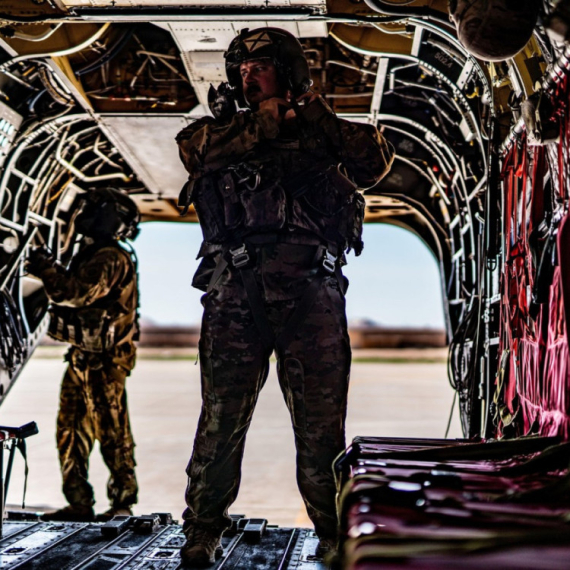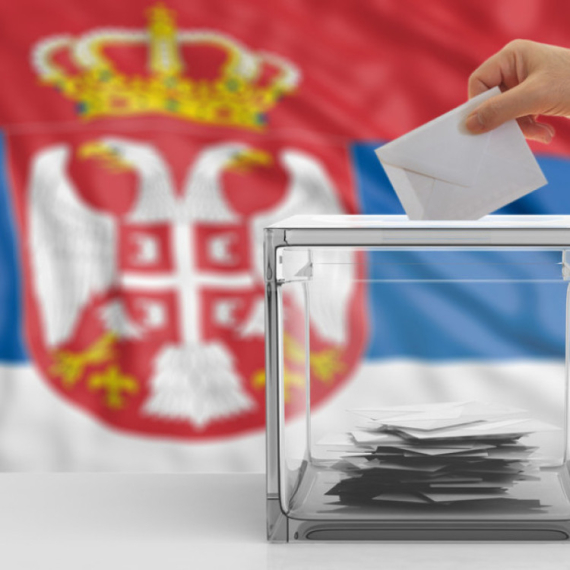CIA was urged to keep interrogation videotapes
The inquiry into whether the CIA destroyed tapes featuring torture of certain Al Qaeda suspects continues.
Saturday, 08.12.2007.
11:03

The inquiry into whether the CIA destroyed tapes featuring torture of certain Al Qaeda suspects continues. White House and Justice Department officials, along with senior members of Congress, advised the Central Intelligence Agency in 2003 against a plan to destroy hundreds of hours of videotapes showing the interrogations of two operatives of Al Qaeda, government officials said Friday. CIA was urged to keep interrogation videotapes The chief of the agency's clandestine service nevertheless ordered their destruction in November 2005, taking the step without notifying even the CIA's own top lawyer, John Rizzo, who was angry at the decision, the officials said. The disclosures provide new details about what General Michael Hayden, the CIA director, has said was a decision "made within CIA itself" to destroy the videotapes. In interviews, members of Congress and former intelligence officials also questioned some aspects of the account Hayden provided Thursday about when Congress was notified that the tapes had been destroyed. Current and former intelligence officials say the videotapes showed severe interrogation techniques used on two Qaeda operatives, Abu Zubaydah and Abd al-Rahim al-Nashiri, who were among the first three terror suspects to be detained and interrogated by the CIA in secret prisons after the Sept. 11 attacks. Top CIA officials had decided in 2003 to preserve the tapes in response to warnings from White House lawyers and lawmakers that destroying the tapes would be unwise, in part because it could carry legal risks, the government officials said. But the government officials said that Jose Rodriguez Jr., then the chief of the agency's clandestine service, the Directorate of Operations, had reversed that decision in November 2005, at a time when Congress and the courts were inquiring deeply into the CIA's interrogation and detention program. Rodriguez could not be reached Friday for comment. As the chairman of the House Intelligence Committee in 2003, Porter Goss, then a Republican congressman from Florida, was among congressional leaders who warned the CIA against destroying the tapes, the former intelligence officials said. Goss became CIA director in 2004 and was serving in the post when the tapes were destroyed, but was not informed in advance about Rodriguez's decision, the former officials said. It was not until at least a year after the destruction of the tapes that any members of Congress were informed about the action, the officials said. On Friday, Representative Peter Hoekstra, the Michigan Republican who was chairman of the House Intelligence Committee from 2004 to 2006, said he had never been told that the tapes were destroyed. "I think the intelligence committee needs to get all over this," said Hoekstra, who has been a strong supporter of the CIA detention and interrogation program. "This raises a red flag that needs to be looked at." The first notification to Congress by the CIA about the videotapes was delivered to a small group of senior lawmakers in February 2003 by Scott W. Muller, then the agency's general counsel. Government officials said that Muller had told the lawmakers that the CIA intended to destroy the interrogation tapes, arguing that they were no longer of any intelligence value and that the interrogations they showed put agency operatives who appeared in the tapes at risk. At the time of the briefing in February 2003, the lawmakers who advised Muller not to destroy the tapes included both Goss and Representative Jane Harman of California, who was the top Democrat on the House Intelligence Committee. Harman described her role on Friday. Goss's role was described by former intelligence officials. According to two government officials, Muller then raised the idea of destroying the tapes during discussions in 2003 with Justice Department lawyers and with Harriet Miers, who was then a deputy White House chief of staff. Miers became White House counsel in early 2005. The officials said that Miers and the Justice Department lawyers had advised against destroying the tapes, but that it was not clear what the basis for their advice had been. A message left at Muller's law office on Friday was not returned, and White House officials would not comment about Miers's role. It was also not clear when the White House or Justice Department were told that the tapes had been destroyed, or whether anyone at either place was notified in advance that Rodriguez had ordered that the step be taken. Dana Perino, the White House spokeswoman, said Friday that President George W. Bush had "no recollection" of being made aware of the tapes' destruction before Thursday, when Hayden briefed him on the matter. In his message to CIA employees on Thursday, Hayden said that the leaders of the intelligence committee had been informed of the agency's "intention to dispose of the material," but he did not say when that notification took place. Several former intelligence officials also said there was great concern that the tapes, which recorded hours of grueling interrogations, could have set off controversies about the legality of the interrogations and generate a backlash in the Middle East. According to one former intelligence official, the CIA then decided to keep the tapes at the CIA stations in the countries where Abu Zubaydah and Nashiri were interrogated. Abu Zubaydah was captured in Pakistan, and it has been reported that he was taken to Thailand for part of his interrogation. It is unclear where Nashiri was interrogated by CIA operatives. Nashiri, a Qaeda operations chief in the Arabian Peninsula until his capture in 2002, is thought to have planned the October 2000 bombing of the destroyer Cole in Yemen. The current and former intelligence officials said that when Rodriguez ultimately decided in late 2005 to destroy the tapes, he did so without advising Rizzo, Muller's successor as the agency's top general counsel. Rizzo and Goss were among the CIA officials who were angry when told that the tapes had been destroyed, the officials said. Rodriguez retired from the agency this year. The Senate Intelligence Committee announced Friday that it was starting an investigation into the destruction of the videotapes. Senator John Rockefeller IV, the West Virginia Democrat who is chairman of the committee, said, "Whatever the intent, we must get to the bottom of it."
CIA was urged to keep interrogation videotapes
The chief of the agency's clandestine service nevertheless ordered their destruction in November 2005, taking the step without notifying even the CIA's own top lawyer, John Rizzo, who was angry at the decision, the officials said.The disclosures provide new details about what General Michael Hayden, the CIA director, has said was a decision "made within CIA itself" to destroy the videotapes. In interviews, members of Congress and former intelligence officials also questioned some aspects of the account Hayden provided Thursday about when Congress was notified that the tapes had been destroyed.
Current and former intelligence officials say the videotapes showed severe interrogation techniques used on two Qaeda operatives, Abu Zubaydah and Abd al-Rahim al-Nashiri, who were among the first three terror suspects to be detained and interrogated by the CIA in secret prisons after the Sept. 11 attacks.
Top CIA officials had decided in 2003 to preserve the tapes in response to warnings from White House lawyers and lawmakers that destroying the tapes would be unwise, in part because it could carry legal risks, the government officials said.
But the government officials said that Jose Rodriguez Jr., then the chief of the agency's clandestine service, the Directorate of Operations, had reversed that decision in November 2005, at a time when Congress and the courts were inquiring deeply into the CIA's interrogation and detention program. Rodriguez could not be reached Friday for comment.
As the chairman of the House Intelligence Committee in 2003, Porter Goss, then a Republican congressman from Florida, was among congressional leaders who warned the CIA against destroying the tapes, the former intelligence officials said. Goss became CIA director in 2004 and was serving in the post when the tapes were destroyed, but was not informed in advance about Rodriguez's decision, the former officials said.
It was not until at least a year after the destruction of the tapes that any members of Congress were informed about the action, the officials said. On Friday, Representative Peter Hoekstra, the Michigan Republican who was chairman of the House Intelligence Committee from 2004 to 2006, said he had never been told that the tapes were destroyed.
"I think the intelligence committee needs to get all over this," said Hoekstra, who has been a strong supporter of the CIA detention and interrogation program. "This raises a red flag that needs to be looked at."
The first notification to Congress by the CIA about the videotapes was delivered to a small group of senior lawmakers in February 2003 by Scott W. Muller, then the agency's general counsel. Government officials said that Muller had told the lawmakers that the CIA intended to destroy the interrogation tapes, arguing that they were no longer of any intelligence value and that the interrogations they showed put agency operatives who appeared in the tapes at risk.
At the time of the briefing in February 2003, the lawmakers who advised Muller not to destroy the tapes included both Goss and Representative Jane Harman of California, who was the top Democrat on the House Intelligence Committee. Harman described her role on Friday. Goss's role was described by former intelligence officials.
According to two government officials, Muller then raised the idea of destroying the tapes during discussions in 2003 with Justice Department lawyers and with Harriet Miers, who was then a deputy White House chief of staff. Miers became White House counsel in early 2005.
The officials said that Miers and the Justice Department lawyers had advised against destroying the tapes, but that it was not clear what the basis for their advice had been.
A message left at Muller's law office on Friday was not returned, and White House officials would not comment about Miers's role.
It was also not clear when the White House or Justice Department were told that the tapes had been destroyed, or whether anyone at either place was notified in advance that Rodriguez had ordered that the step be taken. Dana Perino, the White House spokeswoman, said Friday that President George W. Bush had "no recollection" of being made aware of the tapes' destruction before Thursday, when Hayden briefed him on the matter.
In his message to CIA employees on Thursday, Hayden said that the leaders of the intelligence committee had been informed of the agency's "intention to dispose of the material," but he did not say when that notification took place.
Several former intelligence officials also said there was great concern that the tapes, which recorded hours of grueling interrogations, could have set off controversies about the legality of the interrogations and generate a backlash in the Middle East.
According to one former intelligence official, the CIA then decided to keep the tapes at the CIA stations in the countries where Abu Zubaydah and Nashiri were interrogated.
Abu Zubaydah was captured in Pakistan, and it has been reported that he was taken to Thailand for part of his interrogation. It is unclear where Nashiri was interrogated by CIA operatives.
Nashiri, a Qaeda operations chief in the Arabian Peninsula until his capture in 2002, is thought to have planned the October 2000 bombing of the destroyer Cole in Yemen.
The current and former intelligence officials said that when Rodriguez ultimately decided in late 2005 to destroy the tapes, he did so without advising Rizzo, Muller's successor as the agency's top general counsel. Rizzo and Goss were among the CIA officials who were angry when told that the tapes had been destroyed, the officials said.
Rodriguez retired from the agency this year.
The Senate Intelligence Committee announced Friday that it was starting an investigation into the destruction of the videotapes.
Senator John Rockefeller IV, the West Virginia Democrat who is chairman of the committee, said, "Whatever the intent, we must get to the bottom of it."
















Komentari 0